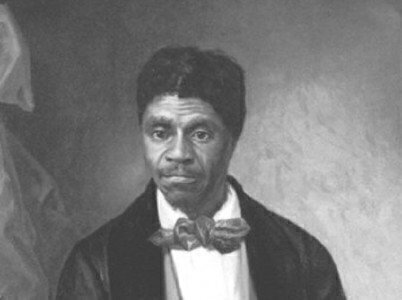
Seems easy enough, doesn't it?--simple and true: once you're free, there's no going back. You're free, free at last. Makes sense. Even a kid would understand.
Well, not so. In the case of more than one slave and former slave, being free for a time, or having been free for months or even years, was not a ticket to ride because, by law in these United States, it was altogether possible and perfectly legal for a free man or woman to be locked up in slavery once more, improbable as that may seem.
And yes, in case you're wondering, I'm talking like a white man. To describe this change--from freedom back into the slavery--as improbable is unfeeling, even racist. Slavery was not a condition, like athlete's foot. It was evil, inhuman.
In the 1830s, historical records make clear that Minnesota's Fort Snelling was home to a dozen slaves, maybe more, people who cooked and cleaned and did whatever work white military brass, their masters, deemed beneath them. Technically, they weren't slaves at Ft. Snelling; in the Wisconsin Territory, slavery was banned. But when officers were reassigned, they took their help along; and, if they went south, those free men and women once again, by law, became slaves.
Dr. John Emerson, a physician, owned slaves, two in fact, a married couple, Dred and Harriet Scott, whose basement apartment you can visit if you stop sometime at Ft. Snelling. It's not a hovel--it's tiny, but then, in the 1830s, Ft. Snelling wasn't the Hilton.
It wasn't there where Mr. and Mrs. Scott started down the long road toward freedom, but it was where they two of them met and married. For the record, Mr. Dred married Harriet, but Dr. Emerson bought Harriet Robinson. (Stunning kind of sentence, isn't it? Dr. Emerson bought Harriet Robinson.)
Slave genealogies get complicated, so stay with me. Dr. Emerson died when they were all in St. Louis. By law, his wife inherited her husband's property, including their slaves. When she chose to hire them out, Dred Scott tried to buy his freedom, to pay to be free, but the widow Emerson wouldn't sell him to himself, or them to themselves. They were slaves.
It was 1843. To call slavery an issue back then understates too. Even though the American Civil War was still 17 years off, true believers on both sides of the issue of slavery were ready to die. Dred and Harriet Scott, slaves once more, took their case for freedom to the courts.
But for them, justice was neither speedy nor justice at all. The Dred Scott decision, handed down from the U. S. Supreme Court on March 6, 1857, denied freedom to the Scotts and their two daughters, when Justice Roger B. Taney, writing for the majority, determined that Dred and Harriet Scott and their daughters, Eliza and Lizzie, were, simply stated, not human.
 It's not complicated. Dred Scott and his family were kept in slavery because fourteen years after the Scotts began to suit for their freedom, seven U. S. Supreme Court justices ruled that black people could not be citizens of the United States of America because in 1787 the U. S. Constitution maintained that Black people were not citizens.
It's not complicated. Dred Scott and his family were kept in slavery because fourteen years after the Scotts began to suit for their freedom, seven U. S. Supreme Court justices ruled that black people could not be citizens of the United States of America because in 1787 the U. S. Constitution maintained that Black people were not citizens. There are a ton of reasons to visit Minnesota's Ft. Snelling. It's a huge place with canons that still rock the stone walls when lit and fired. There's eats and treats galore on any weekend. Visit the hospital, the officer's quarters, or take a stroll on the grass of the parade grounds. The Mall of America isn't far away.
But it will do your soul well to step into a little basement apartment--it's neat and clean, the walls adorned with utensils of the age. It's the place where a slave couple lived, long ago, in another age, a man and a woman who spent fourteen years fighting to be free, only to be denied by the most appalling verdict ever laid down by the highest court of our land: "no, you can't be free."
There's a tour guide who'll tell you about Dred and Harriet Scott. She'll tell you the story. She does a good job. Get the kids to listen.
Seriously, get the kids to listen.
No comments:
Post a Comment